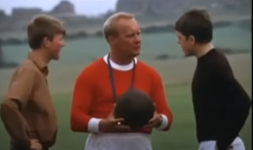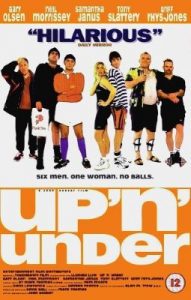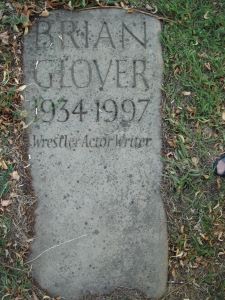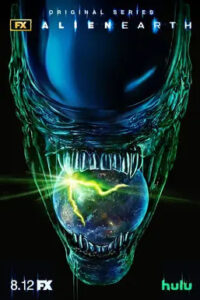
© 26 Keys Productions / Scott Free / 20th Television / FXP
What an exasperating franchise the Alien one is. It kicked off in 1979 with one masterpiece, Ridley’s Scott’s Alien, and continued in 1986 with another masterpiece, James Cameron’s Aliens. But its instalments after that have been, in various ways, maddeningly uneven. They’ve contained some intriguing ideas, themes, characters, sequences and images. Yet those good things were nullified by other things that were utterly duff.
David Fincher’s Alien 3 (1992) had as its setting a fascinatingly grim, labyrinthine industrial complex that’d been repurposed as a prison. But it was hamstrung by an ill-conceived script wherein most of the interesting characters vanished halfway through and the movie’s interminable final act consisted of indistinguishable bald guys running Super-Mario-like through corridors.
Jean-Pierre Jeunet’s Alien Resurrection (1998) had some great ideas – Sigourney Weaver’s Ripley character reincarnated as a superhuman clone containing bits of alien DNA, the setting of a stricken space station that’s basically The Poseidon Adventure (1974) in outer space, gripping action set-pieces underwater and on a vertiginous ladder. But it suffered from juvenile plotting and dialogue, a crap-looking new monster (‘the Newborn’), and misjudged performances ranging from Ron Perlman’s obnoxious overacting to Winona Ryder’s wan underacting.
In 2012 and 2017 Ridley Scott returned to the franchise and made two prequels, Prometheus and Alien: Covenant, which again had some nice touches – especially Michael Fassbender’s performances as the angelic android Walter and the devilish android David. But the prequels were ruined by their obsession with creating an over-complicated and unnecessary backstory for the aliens. Also, there were some clunking scenes such as the one in Covenant where Walter and David meet up, Walter starts playing a flute, and David suggests, “You blow, I’ll do the fingering.” Ooh-err, missus.
Recently, we got Fede Alvarez’s Alien: Romulus (2024) and, again, some lovely moments – a sequence where the surviving protagonists have to negotiate a shaft in zero gravity while deadly globules of acidic alien-blood float around them; or a bit where a hitherto nice android (David Jonsson) hooks into some tech in order to open a door, accidentally gets upgraded, and turns into a callous shit. But Alien: Romulus blew its potential by paying too much fan-service to the previous films. “Please,” I was thinking as the film’s big finale approached. “Don’t anyone say, ‘Get away from her, you bitch!’” But wouldn’t you know it? Someone did.

© 20th Century Studios / Scott Free Productions / Brandywine Productions
You’ll notice I haven’t mentioned the two crossover movies where the aliens encounter the creatures from the Predator franchise, Alien vs Predator (2004) and Alien vs Predator: Requiem (2007). That’s because I regard both films as unspeakable shite that deserves to be fired into a black hole.
Now we’ve just had an eight-part TV series entitled Alien: Earth. This was masterminded by Noah Hawley, responsible for five seasons of the Fargo TV show (2014-24) inspired by the 1996 movie of the same name made by Joel and Ethan Cohen. It pains me to say that I feel the way about it as I feel about the post-Aliens alien movies. Alien: Earth has some good bits, but those are offset by some crap bits.
Here’s Alien: Earth’s set-up. (Be warned that spoilers for the series are coming.) It takes place in 2120, shortly before the events depicted in Ridley Scott’s original Alien. Earth is controlled by half-a-dozen super-corporations, including Weyland-Yutani – ‘the Company’ – which featured in the movies. Episode One sees a Weyland-Yutani spaceship, which has been on a mission of exploration and has collected specimens of five different extra-terrestrial species, including some worryingly familiar-looking eggs, return to earth, out-of-control, and crash into a skyscraper in Bangkok. Thailand is the property not of Weyland-Yutani but a rival corporation called Prodigy. The young, impulsive CEO of Prodigy, Boy Kavalier (Samuel Blenkin), sends in rescue and security teams to secure the disaster site – but also to seize whatever cargo the spaceship is carrying.
Lately, Prodigy’s big project has been to ‘upload’ human consciousnesses – souls, basically – into super-strong and super-durable synthetic bodies. The results aren’t just ‘synths’ – the trendier term for the ‘androids’, like Ash, Bishop, Call, David and Walter, who appeared earlier in the franchise – but ‘hybrids’, which have human ghosts in their synthetic machines. However, Prodigy has only been able to do this with young consciousnesses – they’ve transplanted the souls of six children, dying from incurable illnesses, into the artificial and enhanced bodies of six adults. The first operation moved the soul of a terminally sick girl called Marcy Hermit into a hybrid Boy Kavalier has christened ‘Wendy’ (Sydney Chandler). He’s a big fan of J.M. Barrie’s Peter Pan (1911) and insists on naming all his hybrids after Peter Pan characters.
Boy Kavalier sends the six hybrids, supervised by an enigmatic synth called Kirsh (Timothy Oliphant), to the crash site to test their responses in an emergency. What he doesn’t know is that Marcy Hermit’s brother (Alex Lawther) is one of the medics already there – and, inevitably, Wendy encounters this sibling of her former self. Meanwhile, it turns out that one spaceship crew-member has survived the crash, a science officer called Morrow (Babou Ceesay), who’s unswervingly loyal to Weyland-Yutani and isn’t about to let a rival company steal his alien specimens. Morrow belongs to a third category of non-human or non-quite-human persons in the 22nd century, besides synths and hybrids. He’s a cyborg, part-machine, and has a mechanical arm that can exude blades or work as an oxy-acetylene torch.
Boy Kavalier gets the five specimens off the spaceship and transports them to his island headquarters, where they’re placed in a laboratory for study. Predictably – and due partly to Morrow’s attempts to retrieve them for Weyland-Yutani – things go wrong and some of them escape. The escapees include one from a much-loved, 46-year-old movie franchise…
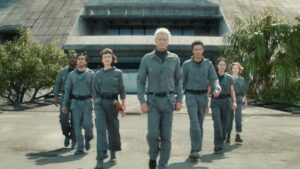
© 26 Keys Productions / Scott Free / 20th Television / FXP
I’ll start with the show’s shortcomings and my first criticism is an obvious one for fans of the films. The aliens aren’t in it much. Alien: Earth features three of the H.R. Giger-designed beasties, one birthed on the spaceship before it crashes into the earth, one created in Prodigy’s laboratory, and one produced by an egg-released ‘face-hugger’ that latches onto a human victim in the same laboratory, but in Alien: Earth they’re little more than a sub-plot. The focus is on the hybrids, synths and cyborgs as they ponder who or what they really are. As such, the show often feels more like a follow-up to another classic Ridley Scott movie, 1982’s Blade Runner.
Also, in Alien: Earth, Wendy gradually becomes able to communicate with the aliens – much to the dismay of her new-found brother. First, she behaves like an ‘alien-whisperer’, but by the last episodes she’s managed to exert full control over them and uses them as attack dogs. This deprives them of agency and – though it’s unsettling to see her direct an alien to tear a platoon of soldiers to pieces – diminishes them as the objects of fear they were in the movies.
And the aliens are inconsistently presented. Several times we see one encounter a group of extras, bloodily slash and chomp its way through them and slaughter them all in a few seconds. But whenever an alien bumps into one of the main cast-members, it immediately becomes slower, clumsier, and more incompetent, which allows the main cast-member to escape. Basically, the aliens can be perfect killing machines or can screw up badly, depending on what the script requires at the time.
And that brings me to Alien: Earth biggest problem. Its scripts are so riddled with holes they’re like slabs of Swiss cheese. The Weyland-Yutani spaceship plunges towards Bangkok and catches everyone by surprise. But weren’t there satellites in space and stations on earth tracking it? Didn’t anyone have an inkling it was on the way? It slams into a skyscraper and is left sticking out of it, but inflicts little structural damage – indeed, there are rich people partying at the top of the skyscraper who don’t even notice what’s happened. This is a whole, humongous spaceship. In 2001, we saw what a pair of passenger planes did to the World Trade Centre. Despite dropping out of the sky, the spaceship manages to end up horizontal after ploughing into the skyscraper. When people enter it from outside, its floors are perfectly and conveniently level.
Meanwhile, Boy Kavalier sends his six hybrids – who’ve presumably cost billions of dollars to create – to the crash scene without any briefing, any guards, any weapons, any protective equipment. Led by Kirsh, they just saunter on board, and it’s purely through good luck that at least three of them don’t get splattered or taken over by the extra-terrestrial specimens there. The illogicalities surrounding the hybrids continue through the series. At one point, Boy Kavalier’s scientists have to ‘wipe’ one hybrid of traumatic memories. But they don’t isolate her and don’t inform the other hybrids of what they’ve done. Afterwards, one of them speaks to her and points out that she’s missing a bunch of memories, and she gets even more screwed up as a result. And the scripts turn the hybrids’ superhuman powers on and off depending on the situation. They’re meant to be superstrong. Indeed, at one point, we see one rip off a soldier’s jaw in a fit of pique. But hybrids Slightly (Adarsh Gourav) and Smee (Jonathan Ajayi) spend most of Episode Seven struggling to transport a face-hugged body across Boy Kavalier’s island. As they huffed and puffed, I was reminded of Basil and Manuel trying to shift a dead hotel-guest in the Fawlty Towers (1975-79) episode The Kipper and the Corpse.
Speaking of which, Boy Kavalier’s island seems to range in size from being big, with characters taking hours to cross it, to being the size of someone’s back lawn. A young alien, newly erupted from someone’s chest and still in snake-like form, has the whole island and its foliage to hide amid. Yet Timothy Oliphant’s Kirsh soon catches it with a small-looking piece of netting. The diminutive alien lifeform known as ‘T. Ocellus’ – basically a tentacled eyeball – manages in a short time to escape from captivity, scuttle across the island on its tiny tentacles, and find a human body lying on a distant beach, which it parasitically attaches itself to and takes over.

© 26 Keys Productions / Scott Free / 20th Television / FXP
All the alien specimens are highly dangerous – not just the acid-blooded ones – so the lack of security protocols around them is head-scratching. On the spaceship, scientists eat and drink in their presence. They leave alien-housing containers improperly sealed. They don’t fasten those containers correctly on their racks. When one creature breaks free, no alarm-bells go off. In Boy Kavalier’s giant complex, they’re kept in close proximity to one another. Shouldn’t they be all be isolated? You never see any guards near them. Often, the only people in the Prodigy laboratory with them are Kirsh and the hybrids – who are, essentially, children. At one point, a single hybrid is left to supervise the specimens alone. When an external feeding-hatch breaks, he gormlessly opens a door and enters a cell to bring a couple of the beasties their food. That doesn’t end well.
Hawley and his writers are simply being lazy. When you write something, especially a science-fiction, fantasy or horror story, you’re confronted by problems of logic, practicality and consistency all the time. A conscientious writer considers those problems and works out ways of solving them. That’s what’s what human creativity is for – for example, figuring out how an alien creature could escape from a laboratory with a working alarm system. It’s facile to just ignore these issues and hope the viewers won’t notice while the plot unfolds.
All this gives the impression I didn’t like Alien: Earth, but I had some fun with it. For one thing, I thought the show’s retro-futuristic look was wonderful. I loved the scenes on the spaceship, where the set-design nostalgically recreated the style of the Nostromo, the ill-fated craft featured in Ridley Scott’s original.
I also enjoyed the performances. Oliphant and Ceesay are excellent as, respectively, Kirsh the Prodigy synth and Morrow the Weyland-Yutani cyborg, and the scene where they at last square up to each other is the highlight of the final episode. The actors and actresses playing the hybrids do a good job of reminding us that, adult thought they look, these are children: variously naïve, trusting, devious, petulant, confused, frightened. I particularly liked the hapless Laurel-and-Hardy double-act of Gourav and Ajayi.
And though the character is obviously a caricature of fabulously-wealthy-far-too-young sociopaths like Mark Zuckerberg, Boy Kavalier is played with entertaining, pantomime-villain flair by Samuel Blenkin. His Peter Pan obsession disturbingly echoes Michael Jackson, another rich and powerful man who gathered children into his lair for unsavory purposes. Also, with his tousled black hair, I thought he bore a troubling resemblance to disgraced fantasy writer Neil Gaiman, now dealing with multiple accusations of sexual assault.
But Alien: Earth’s breakout star is surely the afore-mentioned ambulatory eyeball, T. Ocellus, which in the course of the series plonks itself in the eye-socket of, and takes control of, a cat, a sheep and Michael Smiley. No offence to Michael Smiley, but when the thing is embedded in the sheep, it’s most terrifying. The sight of that bloody-faced ewe, with an outsized eyeball, staring impassively from its place of containment, is the stuff of nightmares.
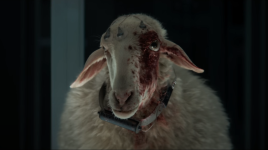
© 26 Keys Productions / Scott Free / 20th Television / FXP








